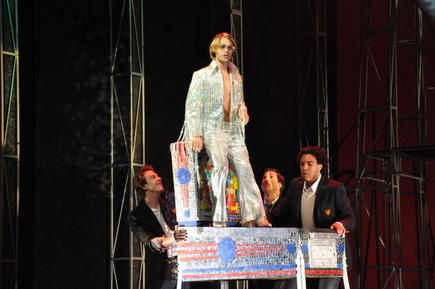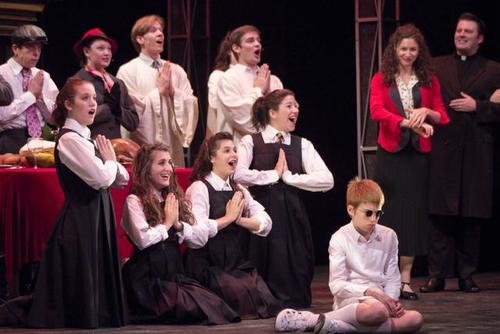Iconic work for merged venues
Published in Berkshire Eagle, 7/8/11

Randy Harrison as Tommy. Photo by Jaime Davidson
_By Jeremy D. Goodwin
STOCKBRIDGE—Your theatre company just merged with a large performing arts venue and you need a big show to open up that stage with a splash. What do you do?
Maybe choose a big, bold musical with great name recognition and appeal to theatre lovers and newbies alike, stocked with some of the most pleasantly earworm-inducing rock songs in the canon.
That's the solution Berkshire Theatre Festival artistic director Kate Maguire found when she scheduled “The Who's Tommy” as her troupe's first production in the Colonial Theatre, after the merger of the two entities earlier this year. She also tapped one of the most familiar BTF directors to helm the production, and its most recognizable star to anchor the cast. The show features a six-piece live band, video projections, and street cred dating back to its forerunning status as one of the greatest albums of the rock era.
“The Who's Tommy,” directed by Eric Hill and featuring Randy Harrison in the title role, began previews this week and runs until July 16. Press opening is tomorrow evening.
Maguire would not allow that there is any special pressure on this show, as the first in the “new” venue, but instead observed there is “enormous excitement” surrounding the production.
Harrison, now in his fifth season at BTF, first came to prominence on television’s “Queer as Folk” and the Broadway production of “Wicked.” In Stockbridge (and, now, Pittsfield), he’s played a wide range of artistically meaty characters, from Nagg in Samuel Becket’s “Endgame” to Billy Bibbit in “One Flew Over the Cookoo’s Nest.” Maguire reveals she had him in mind from the outset, and secured his participation before announcing the show.
“We had the horses to pull it off,” she says, in reference to Harrison and BTF alum James Barry, who plays the crucial figure Captain Walker after having a good winter with a turn in the Tony-nominated “Bloody Bloody Andrew Jackson.”
This musical was adapted from the The Who's iconic rock album by Peter Townshend and Des McAnuff in 1992, launching a celebrated Broadway run the next year. It boasts several tunes likely to be familiar to anyone who's spent any time listening to classic rock radio—"The Acid Queen," "Pinball Wizard," "I'm Free," and "Listening to You" among them. A gaudy 1975 film adaptation of the original album also hangs in the air above the show.
STOCKBRIDGE—Your theatre company just merged with a large performing arts venue and you need a big show to open up that stage with a splash. What do you do?
Maybe choose a big, bold musical with great name recognition and appeal to theatre lovers and newbies alike, stocked with some of the most pleasantly earworm-inducing rock songs in the canon.
That's the solution Berkshire Theatre Festival artistic director Kate Maguire found when she scheduled “The Who's Tommy” as her troupe's first production in the Colonial Theatre, after the merger of the two entities earlier this year. She also tapped one of the most familiar BTF directors to helm the production, and its most recognizable star to anchor the cast. The show features a six-piece live band, video projections, and street cred dating back to its forerunning status as one of the greatest albums of the rock era.
“The Who's Tommy,” directed by Eric Hill and featuring Randy Harrison in the title role, began previews this week and runs until July 16. Press opening is tomorrow evening.
Maguire would not allow that there is any special pressure on this show, as the first in the “new” venue, but instead observed there is “enormous excitement” surrounding the production.
Harrison, now in his fifth season at BTF, first came to prominence on television’s “Queer as Folk” and the Broadway production of “Wicked.” In Stockbridge (and, now, Pittsfield), he’s played a wide range of artistically meaty characters, from Nagg in Samuel Becket’s “Endgame” to Billy Bibbit in “One Flew Over the Cookoo’s Nest.” Maguire reveals she had him in mind from the outset, and secured his participation before announcing the show.
“We had the horses to pull it off,” she says, in reference to Harrison and BTF alum James Barry, who plays the crucial figure Captain Walker after having a good winter with a turn in the Tony-nominated “Bloody Bloody Andrew Jackson.”
This musical was adapted from the The Who's iconic rock album by Peter Townshend and Des McAnuff in 1992, launching a celebrated Broadway run the next year. It boasts several tunes likely to be familiar to anyone who's spent any time listening to classic rock radio—"The Acid Queen," "Pinball Wizard," "I'm Free," and "Listening to You" among them. A gaudy 1975 film adaptation of the original album also hangs in the air above the show.

Photo by Jaime Davidson
_Yet beneath the great music and its broader cultural
associations is a deeply psychological story about a troubled family.
When Captain Walker returns from war to find his wife has taken a lover,
he kills the interloper in front of his young son, Tommy. Instantly
turned into co-conspirators, Captain Walker and Mrs. Walker (played by
BTF newcomer Jenny Powers, seen on Broadway in “Grease” and “Little
Women”) insist to their boy that he didn’t see or hear anything, and he
responds by entering a prolonged catatonic state. Tommy eventually
becomes an international pinball sensation, but he learns the limits of
stardom when he tries to step outside of the role to which his fans have
elevated him.
On a recent afternoon in a crowded rehearsal studio at BTF’s Lavan Campus, Hill urges members of the cast to preserve their nervous energy.
“If you let go of that, we just have a musical,” he says. “I want a rock musical.”
Later, discussing the production over a sandwich with Harrison and Barry, Hill elaborates.
“The difference is an attitude. These people are all well-trained. They have wonderful theatrical voices. But I want to mess that up a little bit,” the director explains. “Tommy is like all of us. We all have this creative impulse inside of us, we all want to break through. Tommy is living that for us in front of our very eyes, he's having that experience. That's why rock and roll superstardom exists, so we can all play air guitar and feel like that.”
Barry says the rock and roll energy is key.
“Part of it is embracing what makes rock and roll [what it is]—being a conduit for raw energy and emotion, but figuring out how to stay in control of that while it's happening. Having done plays and performed in rock bands, they're very different kinds of performance energy. It's great to straddle that line.”
Though the characters pass through extreme emotional states, the actors inhabiting them are lacking a usual source of clues to help them unlock their motivations: there is no dialogue. It’s all songs.
Harrison has a particularly large leap to make, spending the first half isolated as the narrator and then appearing as a deaf, blind mute.
“I can’t look for textural clues. I have to listen to the music for the answers. I think the strongest thing for me has been letting the music come into me, thinking of myself as an expression of the music,” he says.
But with whom will Harrison respond to and play off?
“I think a huge character for me is going to be the audience. The audience is going to play an enormous part for me as far as the people I’m trying to get a response from and talk to.
“But,” he continues with a soft laugh, “I’m really excited to talk to another actor onstage soon.”
On a recent afternoon in a crowded rehearsal studio at BTF’s Lavan Campus, Hill urges members of the cast to preserve their nervous energy.
“If you let go of that, we just have a musical,” he says. “I want a rock musical.”
Later, discussing the production over a sandwich with Harrison and Barry, Hill elaborates.
“The difference is an attitude. These people are all well-trained. They have wonderful theatrical voices. But I want to mess that up a little bit,” the director explains. “Tommy is like all of us. We all have this creative impulse inside of us, we all want to break through. Tommy is living that for us in front of our very eyes, he's having that experience. That's why rock and roll superstardom exists, so we can all play air guitar and feel like that.”
Barry says the rock and roll energy is key.
“Part of it is embracing what makes rock and roll [what it is]—being a conduit for raw energy and emotion, but figuring out how to stay in control of that while it's happening. Having done plays and performed in rock bands, they're very different kinds of performance energy. It's great to straddle that line.”
Though the characters pass through extreme emotional states, the actors inhabiting them are lacking a usual source of clues to help them unlock their motivations: there is no dialogue. It’s all songs.
Harrison has a particularly large leap to make, spending the first half isolated as the narrator and then appearing as a deaf, blind mute.
“I can’t look for textural clues. I have to listen to the music for the answers. I think the strongest thing for me has been letting the music come into me, thinking of myself as an expression of the music,” he says.
But with whom will Harrison respond to and play off?
“I think a huge character for me is going to be the audience. The audience is going to play an enormous part for me as far as the people I’m trying to get a response from and talk to.
“But,” he continues with a soft laugh, “I’m really excited to talk to another actor onstage soon.”
